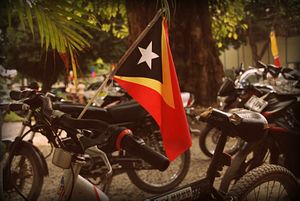After years of pushing for membership, Timor-Leste is now ready to become the 11th member of the Association of Southeast Asian Nations (ASEAN). The process of Timor-Leste’s accession into ASEAN has been ongoing for a number of years. The country was recognized as an ASEAN observer in 2002 and joined the ASEAN Regional Forum in 2005. Southeast Asia’s newest state submitted a formal application to join the regional bloc in 2011.
The country’s leaders said that they made a “strategic decision” to become an ASEAN member state in the future. In 2007, outgoing President Jose Ramos-Horta reiterated the message that joining ASEAN was a top priority for his country. After the 2012 presidential elections, the new government reaffirmed their commitment to join the regional bloc.
The nation-state had expressed interest to join the regional group as early as 2003. At that time only Thailand and Cambodia were backing its membership bid.
Political and Economic Development
Timor-Leste formally gained its independence in 2002, after a long and protracted struggle to secede from Indonesia. Its secession has made Timor-Leste one of the newest countries in the international system.
The tiny Southeast Asian state has come a long way in the last 14 years in terms of economic, political, and social development. According to the 2011 World Development Report, most post-conflict nations take between 15 and 30 years to move out of fragility. Timor-Leste’s economic development, driven by its offshore petroleum revenue in the Timor Gap, has helped enhance its social services and human development.
Timor-Leste is now ranked higher than its neighbors (Cambodia, Laos, and Myanmar) on the Human Development Index. In terms of income per capita, the small nation has overtaken other ASEAN members: Cambodia, Laos, Burma, and Vietnam.
The country is also gaining reputation for being an outspoken advocate of democracy and human rights. Many Southeast Asian countries have been criticized for their poor human rights records. Vietnam and Laos remain one-party communist states, Brunei is an absolute monarchy that imposes Sharia law, and Thailand has slipped into a military rule.
On the other hand, Timor-Leste ranks higher as a democratic nation than its neighbors thanks to a multi-party democracy. To date, the small nation has held two presidential and legislative elections that were regarded as democratically free and fair by international observation missions. The country has also developed an active civil society that promotes human rights domestically and internationally. Timor-Leste is a member of multiple regional human rights bodies, such as the National Human Rights Institutions Forum and the Asia Pacific Forum. This year, when ASEAN chair Laos declined to host the ASEAN People’s Forum, the bloc’s annual civil society meeting, Timor-Leste stepped up instead.
Ten years ago, Timor-Leste was still reeling from Indonesia’s military withdrawal. Now it has not only made peaceful reconciliations with its neighbor, but sees it as a crucial partner. Politicians in Timor-Leste are in talks with Indonesia on border negotiations. Approximately 98 percent of the outstanding issues have been resolved after guarantees over land rights were accepted by families living along the border of the two countries.
ASEAN Readiness
The country is consolidating its readiness for ASEAN membership by actively participating as an observer in meetings of ASEAN sectoral bodies, convening workshops and seminars. Earlier this year, the country sent a representative to attend the ASEAN Regional Forum Workshop on Improving Fisheries Management. This was the third ASEAN Regional Forum meeting attended by Timor-Leste. Timor Leste has also signaled that it will steer toward a even closer relationship with ASEAN in the future.
Earlier this year, Indonesia raised hopes for Timor-Leste’s membership into the regional bloc. The Indonesian ambassador to ASEAN, Rahmat Pramono, said that a feasibility study on Timor-Leste’s membership, launched in 2011, was almost complete. The study emphasized three pillars – politics and security, economy, and socio-cultural factors.
“The politics, security and economy studies have been assessed, while the socio-cultural assessment is expected to be completed by the end of this year,” Rahmat said.
Besides Indonesia, Malaysia, Thailand, Cambodia, Brunei, the Philippines, and Myanmar are supportive of the country’s bid. The outgoing president of the Philippines, Benigno Aquino, even pledged his support for Timor-Leste’s membership in 2013 — especially important as the Philippines holds the ASEAN chair for 2017. Only Singapore and Laos have repeatedly blocked the country’s bid on the grounds that it is not yet developed enough to join the regional organization. They think that Timor-Leste needs to overcome a number of hurdles before receiving membership.
Timor-Leste’s record of transparent elections and high human development index reflect its seriousness toward moving forward in its nation-building process. It is also following the necessary steps and processes to abide with ASEAN requirements. If its admission is realized, it could potentially provide economic prosperity for the country.
Roshni Kapur is a graduate student at the University of Sydney majoring in Peace and Conflict Studies.
































